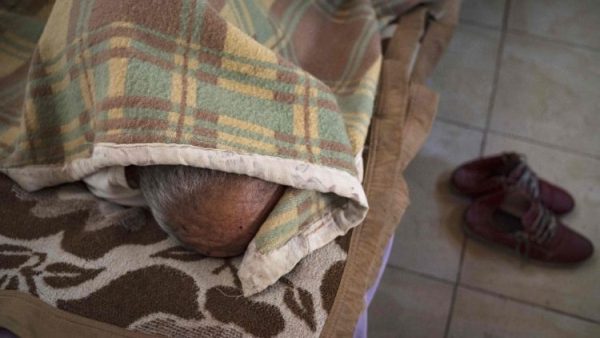Sr. Maria's experience of running a center for migrants and the homeless
 Sister Maria Giovanna Titone, CSJ, a Sister of St. Joseph of Chambèry, runs a parish dormitory in northern Italy, and tells of how she was able to "touch so many stories" and learn to face challenges so much bigger than herself.
Sister Maria Giovanna Titone, CSJ, a Sister of St. Joseph of Chambèry, runs a parish dormitory in northern Italy, and tells of how she was able to "touch so many stories" and learn to face challenges so much bigger than herself.
Coordinating the management of a parish dormitory entails coming into direct contact with many stories.
My previous volunteer experiences with homeless people were perhaps more focused on finding “strategies” to approach them and on giving them what little I could: something to eat or drink, some forced words of comfort and encouragement, along with useful, or presumably useful, information.
Managing a drop-in centre, on the other hand, comes with its own set of challenges. It involves setting aside even one’s best intentions to make room for the lives of the people we host and to continue to proclaim Christian hope even in the face of powerlessness, to which we are so often exposed.
Dormitory in Italian city of Ravenna
Our “Good Samaritan” dormitory, which is located in the Saint Rocco Parish in the Italian city of Ravenna, faces the daily challenge of relating to resignation and loss of purpose. Quite striking are the continuous housing requests from young migrants, who find themselves in limbo while they wait for papers and to be inserted into the CAS (Extraordinary Housing Centres), which are increasingly more crowded.
Ravenna is not part of the primary migration route, but word got out that the police headquarters there are faster at processing paperwork — inaccurate information — and so, many migrants go this route in the hopes of expediting the process of obtaining legal status in Italy. But they end up facing long waiting periods (from two to eight months, on average) without work, housing or money — in other words, on the streets.
Equally numerous are requests from people suffering from mental illness and addiction, who cannot find adequate protection either in their families or in the healthcare system and thus end up going in and out of dormitories like ours.
Our small facility, which in the Covid era can house up to 15 men and three women, thus finds itself facing challenges that are much bigger than itself. I have often found myself wondering what it means to live the Gospel message in this dormitory, which requires determination, attention to detail and an overall view, caring for relationships with public institutions, knowledge of the territory and its resources, and awareness of one’s own personal limitations and of the limitations of welcoming, without getting caught up in a “saviour complex” or discouragement. In fact, we find ourselves having to make difficult decisions, like pushing some people away because of aggression or serious violations of internal regulations, or saying “no” to welcoming, recognising that we are unable to address some of the problems that our guests experience.
Work of volunteers
Taking on the burden of caring for these people alone is not the responsibility of our small welcoming facility, which was founded more than 20 years ago by Fr Ugo Salvatori — priest of the Archdiocese of Ravenna-Cervia — and carried forward by volunteers, taking on the drama of these people, on their own.
The administrations with which we try to network often end up leaning on realities like ours to provide emergency responses in situations where such aid should be recognised as a right. It is well known that there is a shortage of economic resources and personnel to follow cases. There is a lack of adequate structures to welcome people with health and housing needs, and bureaucratic waiting times for legalising the presence of migrants in our country are too long and uncertain.
Precisely for all these reasons, providing a bed and a shower is not enough, though for the people we welcome, a bed and shower are enough to save them from the streets and from desperation. We need to be the voice of those who are without a voice in our Western society, drawing the attention of institutions and public opinion so that remembering the least ones is not merely an electoral campaign slogan but a demand for civility, even before a demand for charity.
Charity and Christian hope
As Christians we cannot settle for policies that use religious symbols to collect votes. We must be demanding and ask that projects and related administrative choices respond to the real needs of the people, and especially of the most vulnerable.
Charity and Christian hope, from the perspective this small parish dormitory offers me, cannot be satisfied by the little we can do. We need an active and critical conscience which feels the imperative to promote social justice and is committed, through concrete choices, to asking that the least not be exploited only to later be forgotten.
As a Church, we must ensure that our founding values are not used to create division among those who can or cannot receive the sacraments, but that they are concretely fulfilled in political and social decisions which promote a society in which the human dignity of every woman and man is recognised.
As Cardinal Matteo Maria Zuppi, President of the Italian Episcopal Conference, underlined when he thanked former [Italian] Prime Minister Draghi, “we must think of people’s suffering and guarantee serious responses, not ideological or deceptive ones, that indicate even, if necessary, sacrifices, while giving security and reasons to hope”; “the fundamental political dialogue must not lack respect and must be characterised by knowledge of the problems, by common visions without cunning, by passion for public affairs and not by ... competitiveness that is only aimed at petty individualistic positions and not at resolving issues”.
Sr. Maria Giovanna Titone
Source: vaticannews.va
